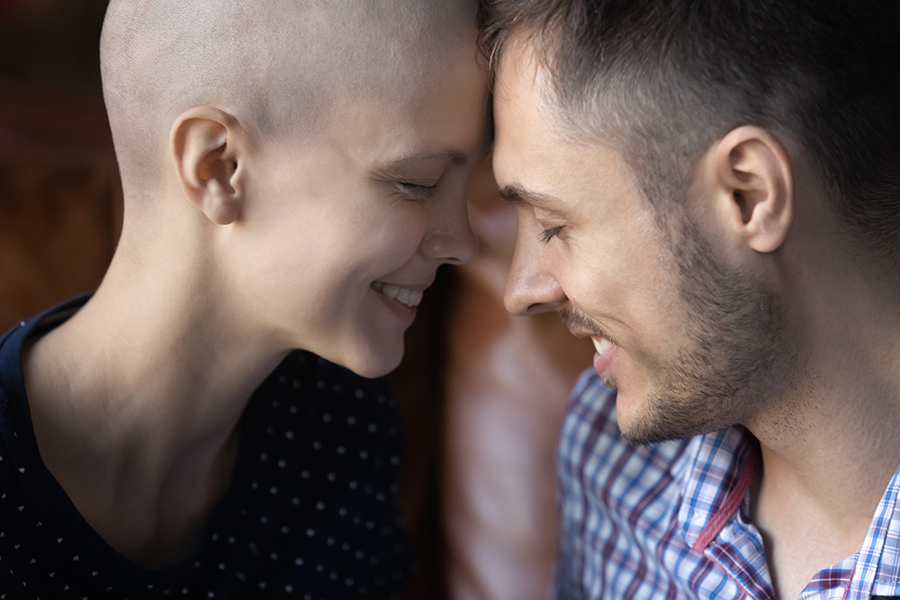Cancer effects all aspects of a person and this includes sexuality. Many of the treatments including surgery, chemotherapy, and radiation will not only produce physical changes, but also emotional changes.
Discussing sexuality can often be uncomfortable for both the healthcare provider and the cancer patient. However, the reality of it is that it is important to talk about it. It is not only important to talk to your healthcare provider it is also very important to keep the lines of communication open between you and your partner. Doing this can help develop a plan that can lead to positive sexual experiences after cancer treatment.
Body Changes
Body changes are normal. Many nerves and blood flow changes can occur with cancer treatment. Both men and women may have changes in hormone levels. Also, medications used to treat pain, nausea, and depression/anxiety can decrease the sex drive. This may mean that your body will feel different and respond differently to sexual arousal and pleasure. You may also have a change in your body image.
Give yourself time to acknowledge these changes and grieve them if necessary. Then reconnect with your body. To do this you can consider getting a manicure, pedicure, or massage. You can also consider finding clothing that makes you feel attractive. Often you will need to relearn what feels good and how you like to be touched again.
Relationships
Many sexual partners will become caregivers during their partner’s cancer treatment. This can lead to changes in the relationship that are more like the parent/child relationship. When cancer treatment is complete, and the patient is no longer needing the intense caregiving it can be difficult to resume the intimate relationship without some type of interventions. One way to start to rebuild this relationship is to talk about and reminisce about how your relationship began. How did you meet? Where was your first kiss? Maybe listen to your favorite song and talk about memorable moments in your relationship. This is a good way to remember why you fell in love.
Intimacy does not always have to mean sexual intercourse. Sex can take a lot of energy that you may not have after undergoing cancer treatment. Find other ways to connect and feel close with your partner. This may include cuddling, massage, taking a bath together, and flirting. Support each other and give each other permission to explore your sexuality individually as well as together.
When you are ready to resume sexual intercourse continue to keep the lines of communication open. There are tools and enhancements that can be used as needed. However, it is important to seek out healthcare provider input to help guide your decisions on what may be useful for you.
Some of these tools may include:
- Lubricants – There are four types of lubricants water based, silicone based, oil based, and hybrid (water/silicone) based. Water based is the most moisturizing but needs to be replaced often because it soaks into the skin. Silicone based will last longer but may not be compatible with silicone sex toys. Oil based should not be used with safer sex barriers made from latex or polyisoprene. Hybrid options combine the moisturizing aspect of the water based with the long-lasting appeal of the silicone base but are harder to find commercially. Many experts recommend using a water-based lubricant first and then applying a silicone-based lubricant after to help with the moisture and to be long-lasting.
- Dilators- used to help stretch the walls of the vagina. They are made in several sizes. They can be helpful after pelvic radiation. Also used to help with painful penetrative sex.
- Vibrator – for helping with arousal, sensation, and orgasm.
- Kegel Exercises – to help keep the pelvic floor strong and flexible.
- Penile Rehabilitation – devices such as vacuum pumps and erections rings to improve erectile function after pelvic cancer treatment or surgery.
Exercise
Just like a healthy diet and exercise is good for physical health it is also good for sexual health. For sexuality it is recommended to eat a lot of fruits, vegetables, and fish. Exercise to break a sweat for 30 minutes at least 5-6 days per week.
Seek out professional help as needed. There are sex therapists that are available to help with sexuality if needed. The Nassif Community Cancer Center is here to help with your cancer related sexual concerns. We have two licensed social workers that are available to talk with and help set an appointment with a sex therapist if needed. We have an exercise specialist for one-on-one exercise and dietitians available to help with any diet concerns. The Cancer Center also offers reduced-cost massage, Healing Energy therapy, and acupuncture.
If you would like to schedule an appointment for any of these services or would like further information, please call 319/558-4876. You can also get more information by visiting our website at www.communitycancercenter.org
Additional Resources
Additional websites that may be helpful for sexuality concerns related to cancer treatment include:
I also recommend the books Women Cancer Sex and Men Cancer Sex both are by Anne Katz, RN

Submitted by







